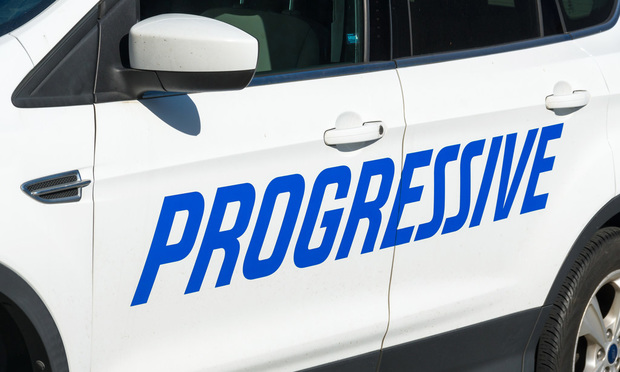3rd Circuit Reverses Dismissal of Consumer Fraud Claim Against Progressive
The panel found the New Jersey Consumer Fraud Act is applicable to the case of an auto insurance agent accused of asking an injured party to sign documents that were not in her native language.
November 16, 2018 at 03:09 PM
4 minute read
 Progressive auto insurance claims vehicle. Photo: Ken Wolter/Shutterstock.com
Progressive auto insurance claims vehicle. Photo: Ken Wolter/Shutterstock.com
New Jersey's Consumer Fraud Act is applicable to a claim that a Progressive auto insurance policyholder was misled into signing a release of her injury claim, the U.S. Court of Appeals for the Third Circuit has ruled in a precedential decision.
The case concerns a woman who suffered injuries in a crash in which her insurance company, Progressive Garden State Insurance Co., also was the insurer for the other driver. A consumer fraud claim was dismissed in U.S. district court based on case law holding that the act does not apply to the denial of insurance benefits. But the appeals court said the plaintiff's claim falls squarely under the CFA, since she relied on false representations of a Progressive agent she believed was looking out for her interests.
Ana Lidia Alpizar-Fallas, who was seriously injured when the car she was riding in was rear-ended in December 2014, was contacted the day after the crash by a claims adjuster from Progressive, who asked her to sign forms that would “expedite the processing” of her claim. But the Progressive agent, Brian Barbosa, did not communicate with her in her native Spanish, and she failed to realize she signed a general release of all claims relating to personal injuries from the crash.
Alpizar-Fallas brought suit against Progressive Garden State Insurance, Barbosa and the driver of the other car, Frank Favero. She brought claims under the New Jersey Unfair Claims Settlement Practices Regulations and the CFA. The defendants removed the case to the U.S. District Court for the District of New Jersey, where Judge Michael Shipp ruled in August 2017 that the New Jersey Supreme Court would likely find that the Consumer Fraud Act did not apply to Alpizar-Fallas' allegations. He relied on Myska v. New Jersey Manufacturers Insurance, a 2015 New Jersey Appellate Division ruling in which an insurance company denied claims for lost value of policyholders' cars after they were damaged in accidents.
But Third Circuit Judges Kent Jordan, Thomas Vanaskie and Marjorie Rendell said Shipp misapplied the Myska case. In the present case, the allegations that Barbosa falsely represented the nature of the documents signed by Alpizar-Fallas, and that Barbosa and others at Progressive have engaged in the same pattern of unlawful conduct with respect to others in similar circumstances, “fall squarely within the language of the CFA,” Rendell wrote for the court.
“These facts, taken together, amount to an allegation of fraud in connection with the subsequent performance of a consumer contract, a situation explicitly covered by the language of the CFA,” Rendell wrote.
The appeals court also rejected Progressive's argument that Alpizar-Fallas failed to conform with the heightened pleading standards of Federal Rule of Civil Procedure 9(b) and did not allege an ascertainable loss, as required under the CFA.
Alpizar-Fallas met the Rule 9(b) standard because she alleged the precise events surrounding her consumer fraud claim and pleaded the time, date and place of appellees' conduct and provided a detailed description of that conduct, Rendell said.
And Alpizar-Fallas alleged in her complaint that she and other class members were stripped of their rights to pursue claims against Progressive policyholders because of the appellees' conduct. In this case, the plaintiff is unable to recover for her losses from the accident, which are detailed in the complaint. She needed and will continue to need medical care, has suffered an impairment of her earning capacity, and has suffered pain, suffering, mental anguish and embarrassment, which are sufficient to demonstrate an ascertainable loss, Rendell said.
The suit was brought on behalf of a class of present and former Progressive policyholders who were involved in motor vehicle accidents with other parties also insured by Progressive.
“As a result of this decision, we're back with, essentially, our entire case,” said Charles Gormally of Brach Eichler in Roseland, who represents Alpizar-Fallas and the putative class.
The case may not have been viable without the CFA claim, because of its fee-shifting provision, he said.
The incidence of abusive tactics by agents in auto accident cases where both drivers have the same insurance company “may appear as some kind of random occurrence but actually happens a lot,” Gormally said.
Kymberly Kochis of Eversheds Sutherland in New York, who argued for Progressive Garden State Insurance Co., did not return a call about the case.
This content has been archived. It is available through our partners, LexisNexis® and Bloomberg Law.
To view this content, please continue to their sites.
Not a Lexis Subscriber?
Subscribe Now
Not a Bloomberg Law Subscriber?
Subscribe Now
NOT FOR REPRINT
© 2025 ALM Global, LLC, All Rights Reserved. Request academic re-use from www.copyright.com. All other uses, submit a request to [email protected]. For more information visit Asset & Logo Licensing.
You Might Like
View All

'A More Nuanced Issue': NJ Supreme Court Considers Appellate Rules for Personal Injury Judgments
5 minute read
Appellate Division Rejects Third Circuit Interpretation of NJ Law, Says No Arbitration for Insurance Fraud
4 minute read
NJ Manufacturing Company Sues Insurer to Recoup PFAS Remediation Losses
4 minute readTrending Stories
Who Got The Work
J. Brugh Lower of Gibbons has entered an appearance for industrial equipment supplier Devco Corporation in a pending trademark infringement lawsuit. The suit, accusing the defendant of selling knock-off Graco products, was filed Dec. 18 in New Jersey District Court by Rivkin Radler on behalf of Graco Inc. and Graco Minnesota. The case, assigned to U.S. District Judge Zahid N. Quraishi, is 3:24-cv-11294, Graco Inc. et al v. Devco Corporation.
Who Got The Work
Rebecca Maller-Stein and Kent A. Yalowitz of Arnold & Porter Kaye Scholer have entered their appearances for Hanaco Venture Capital and its executives, Lior Prosor and David Frankel, in a pending securities lawsuit. The action, filed on Dec. 24 in New York Southern District Court by Zell, Aron & Co. on behalf of Goldeneye Advisors, accuses the defendants of negligently and fraudulently managing the plaintiff's $1 million investment. The case, assigned to U.S. District Judge Vernon S. Broderick, is 1:24-cv-09918, Goldeneye Advisors, LLC v. Hanaco Venture Capital, Ltd. et al.
Who Got The Work
Attorneys from A&O Shearman has stepped in as defense counsel for Toronto-Dominion Bank and other defendants in a pending securities class action. The suit, filed Dec. 11 in New York Southern District Court by Bleichmar Fonti & Auld, accuses the defendants of concealing the bank's 'pervasive' deficiencies in regards to its compliance with the Bank Secrecy Act and the quality of its anti-money laundering controls. The case, assigned to U.S. District Judge Arun Subramanian, is 1:24-cv-09445, Gonzalez v. The Toronto-Dominion Bank et al.
Who Got The Work
Crown Castle International, a Pennsylvania company providing shared communications infrastructure, has turned to Luke D. Wolf of Gordon Rees Scully Mansukhani to fend off a pending breach-of-contract lawsuit. The court action, filed Nov. 25 in Michigan Eastern District Court by Hooper Hathaway PC on behalf of The Town Residences LLC, accuses Crown Castle of failing to transfer approximately $30,000 in utility payments from T-Mobile in breach of a roof-top lease and assignment agreement. The case, assigned to U.S. District Judge Susan K. Declercq, is 2:24-cv-13131, The Town Residences LLC v. T-Mobile US, Inc. et al.
Who Got The Work
Wilfred P. Coronato and Daniel M. Schwartz of McCarter & English have stepped in as defense counsel to Electrolux Home Products Inc. in a pending product liability lawsuit. The court action, filed Nov. 26 in New York Eastern District Court by Poulos Lopiccolo PC and Nagel Rice LLP on behalf of David Stern, alleges that the defendant's refrigerators’ drawers and shelving repeatedly break and fall apart within months after purchase. The case, assigned to U.S. District Judge Joan M. Azrack, is 2:24-cv-08204, Stern v. Electrolux Home Products, Inc.
Featured Firms
Law Offices of Gary Martin Hays & Associates, P.C.
(470) 294-1674
Law Offices of Mark E. Salomone
(857) 444-6468
Smith & Hassler
(713) 739-1250






